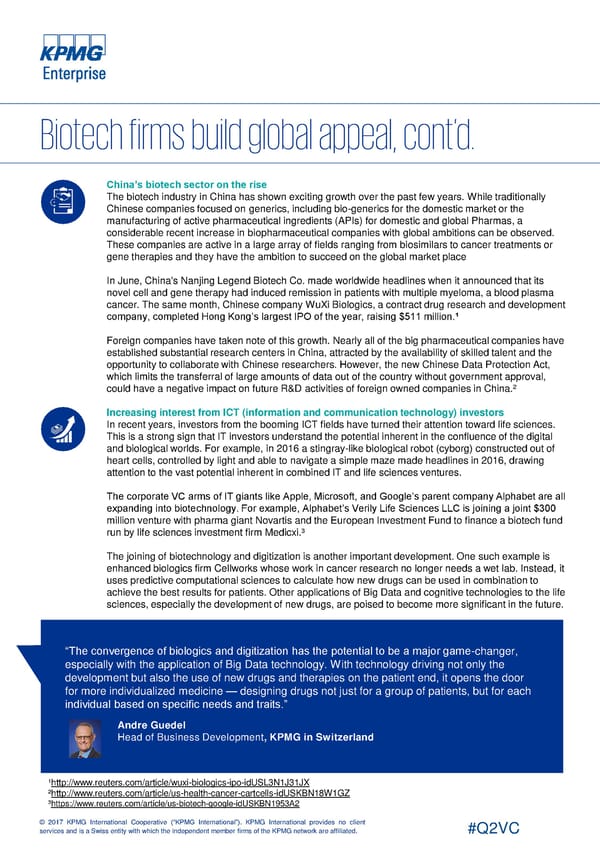China’s biotech sector on the rise The biotech industry in China has shown exciting growth over the past few years. While traditionally Chinese companies focused on generics, including bio-generics for the domestic market or the manufacturing of active pharmaceutical ingredients (APIs) for domestic and global Pharmas, a considerable recent increase in biopharmaceutical companies with global ambitions can be observed. These companies are active in a large array of fields ranging from biosimilars to cancer treatments or gene therapies and they have the ambition to succeed on the global market place In June, China's Nanjing Legend Biotech Co. made worldwide headlines when it announced that its novel cell and gene therapy had induced remission in patients with multiple myeloma, a blood plasma cancer. The same month, Chinese company WuXi Biologics, a contract drug research and development company, completed Hong Kong’s largest IPO of the year, raising $511 million.¹ Foreign companies have taken note of this growth. Nearly all of the big pharmaceutical companies have established substantial research centers in China, attracted by the availability of skilled talent and the opportunity to collaborate with Chinese researchers. However, the new Chinese Data Protection Act, which limits the transferral of large amounts of data out of the country without government approval, could have a negative impact on future R&D activities of foreign owned companies in China.² Increasing interest from ICT (information and communication technology) investors In recent years, investors from the booming ICT fields have turned their attention toward life sciences. This is a strong sign that IT investors understand the potential inherent in the confluence of the digital and biological worlds. For example, in 2016 a stingray-like biological robot (cyborg) constructed out of heart cells, controlled by light and able to navigate a simple maze made headlines in 2016, drawing attention to the vast potential inherent in combined IT and life sciences ventures. The corporate VC arms of IT giants like Apple, Microsoft, and Google’s parent company Alphabet are all expanding into biotechnology. For example, Alphabet’s Verily Life Sciences LLC is joining a joint $300 million venture with pharma giant Novartis and the European Investment Fund to finance a biotech fund run by life sciences investment firm Medicxi.³ The joining of biotechnology and digitization is another important development. One such example is enhanced biologics firm Cellworks whose work in cancer research no longer needs a wet lab. Instead, it uses predictive computational sciences to calculate how new drugs can be used in combination to achieve the best results for patients. Other applications of Big Data and cognitive technologies to the life sciences, especially the development of new drugs, are poised to become more significant in the future. “The convergence of biologics and digitization has the potential to be a major game-changer, especially with the application of Big Data technology. With technology driving not only the development but also the use of new drugs and therapies on the patient end, it opens the door for more individualized medicine — designing drugs not just for a group of patients, but for each individual based on specific needs and traits.” Andre Guedel Head of Business Development, KPMG in Switzerland ¹http://www.reuters.com/article/wuxi-biologics-ipo-idUSL3N1J31JX ²http://www.reuters.com/article/us-health-cancer-cartcells-idUSKBN18W1GZ ³https://www.reuters.com/article/us-biotech-google-idUSKBN1953A2 © 2017 KPMG International Cooperative (“KPMG International”). KPMG International provides no client services and is a Swiss entity with which the independent member firms of the KPMG network are affiliated. #Q2VC
 Global Page 18 Page 20
Global Page 18 Page 20